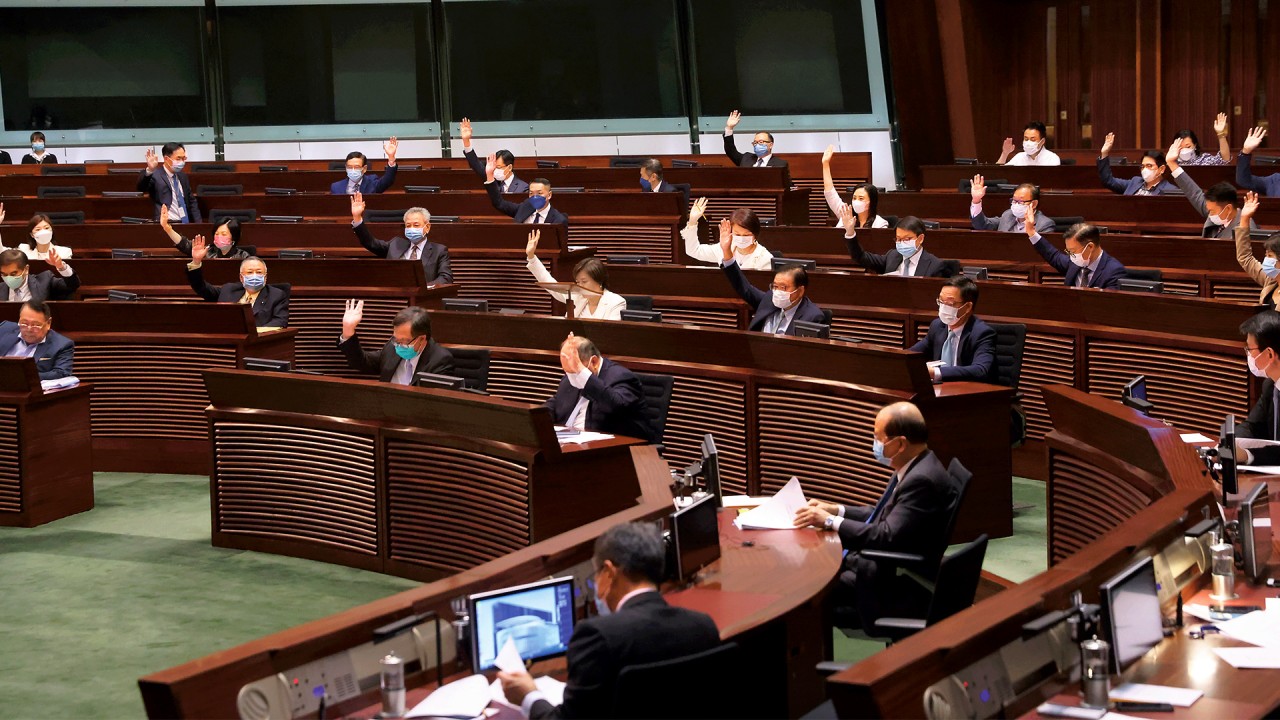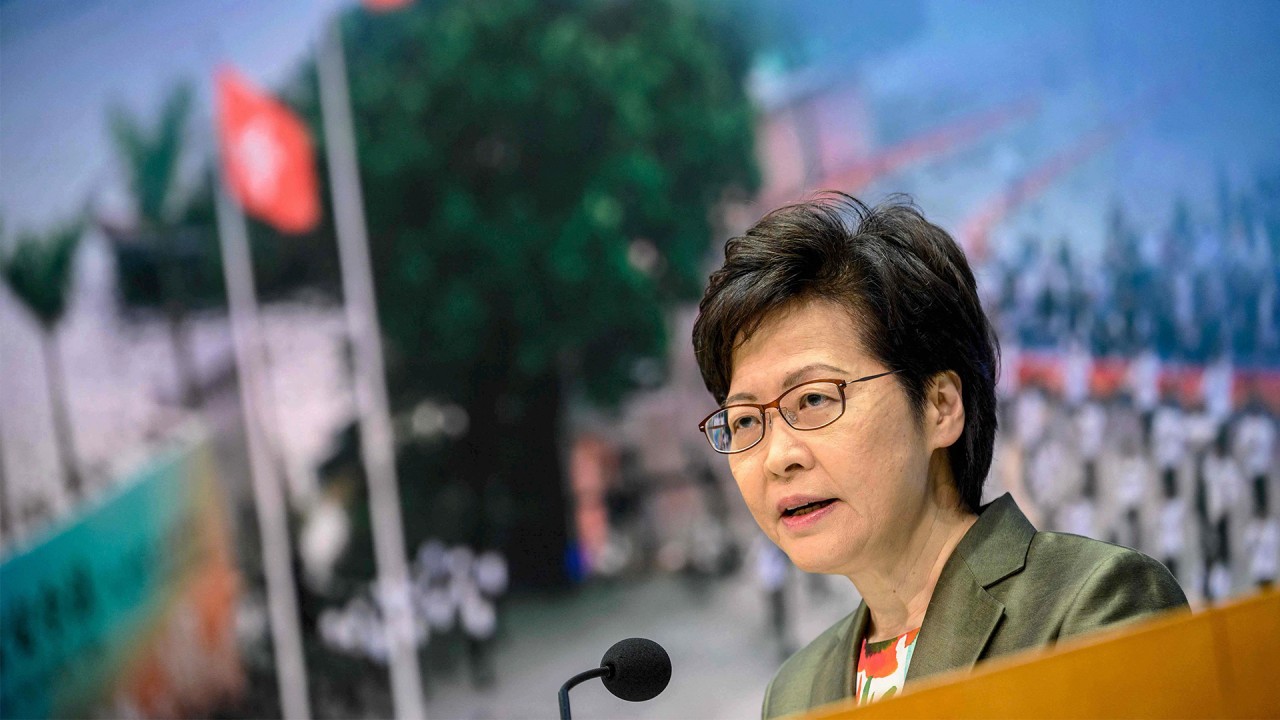
Hong Kong electoral changes: lawmakers pass landmark bill to drastically reshape political system
- Legislation further sidelines a dwindling opposition accused by authorities of trying to sabotage and paralyse governance
- With nearly all opposition lawmakers ousted from their seats or having resigned in protest, pro-establishment members ensured bill sailed through Legco
Hong Kong passed a landmark bill on Thursday to drastically reshape its electoral system and meet Beijing’s bottom line that only “patriots” should be allowed to govern the city, effectively expanding the influence of pro-establishment forces in key political bodies.
It was passed with 40 pro-establishment lawmakers voting “yes”, while two independent opposition members – Cheng Chung-tai and Dr Pierre Chan – remained against it.

00:25
Hong Kong Legco approves Beijing’s political overhaul including ‘patriot’ rule
“It is natural and in line with international norm to require people vested with governing powers to be patriotic,” she said. “Whoever meets the requirements and criteria of being a patriot, irrespective of their political stance, can participate in elections and be elected in accordance with the law.”
In Beijing, the State Council’s Hong Kong and Macau Affairs Office, a cabinet-level agency overseeing the city’s affairs, welcomed it as a significant achievement in “rectifying the wrongs”, while ushering in a “new chapter” of good governance. Other government departments in Beijing would offer support to the city in promoting the new electoral arrangement, the office said.
Hong Kong electoral reforms: ‘set out expectations for lawmakers’
But Lo Kin-hei, chairman of the city’s largest opposition group, the Democratic Party, said the legislative changes had reduced general voters’ say in elections.
“This, we believe, is a retrogression. It has been reflected in many surveys that people think we are taking steps backwards in terms of Hong Kong’s march to real democracy,” he said.
Beijing laid out a blueprint for the city’s political overhaul at the nation’s annual parliamentary meetings in March, and Hong Kong followed with drafting the legislation, officially known as the Improving Electoral System (Consolidated Amendments) Bill 2021.
Pro-establishment lawmakers had arranged more than 17 meetings, taking up to 50 hours since April, before passing the bill on Thursday.
Under the sweeping changes, the Election Committee, tasked with selecting the city’s chief executive, will expand by 300 seats to become a 1,500-strong body introducing a new sector that draws its membership from prominent national bodies.
The committee will also draw members from groups representing Hongkongers living or working in mainland China.
Members of Hong Kong’s municipal-level district councils, which have been dominated by the opposition since 2019, will be stripped of their seats on the Election Committee.
The current 70 seats in Legco will be expanded to 90. Its 35 directly elected seats in the geographical constituencies will be reduced to 20, while 40 seats will be returned by the Election Committee.
What you need to know about Hong Kong’s electoral changes
Ahead of the vote, Secretary for Constitutional and Mainland Affairs Erick Tsang Kwok-wai, who spearheaded the local legislative changes, said the reform would ensure stability.
“Western media and the local opposition have criticised our plan as retrogression in democracy, violating Hong Kong people’s right to vote, or even exaggerated it as an end to ‘one country, two systems’,” he said, referring to the governing formula under which the city is promised a high degree of autonomy.
“By making these groundless and malicious allegations, critics have completely ignored the chaos that emerged in Hong Kong’s legislature and society in the past few years.”

01:37
Hong Kong announces more electoral system changes to block opposition
Tsang accused opposition lawmakers in the past of colluding with foreign forces, now banned under the Beijing-imposed national security law, by calling for international sanctions against Hong Kong and mainland China.
Former chief executives Tung Chee-hwa and Leung Chun-ying, now both vice-chairmen of the Chinese People’s Political Consultative Conference (CPPCC), the country’s top advisory body, welcomed the passage of the bill.
Leung, whose open criticism of local government policies recently has prompted speculation that he may be interested in running for chief executive again, said the electoral changes would help solve the “violence and filibustering in the Legco chamber” seen in the past.
10 questions to make sense of tectonic shift in Hong Kong politics
Financial Secretary Paul Chan Mo-po wrote in a Facebook post that it was a “milestone” for Hong Kong, whose “golden time” with mainland China had been hindered by political disputes in the past decade.
Martin Liao, the convenor of Legco’s pro-establishment camp, said the electoral overhaul would help prevent “anti-China disrupters” from entering the power structure of Hong Kong.
Anthony Wu Ting-yuk, a standing committee member of the CPPCC, said the bill’s passage was conducive to the city’s economic development and improvement of people’s livelihoods.
Lo, from the Democratic Party, revealed that he and his colleagues had been approached by people from the pro-establishment camp and Beijing who urged them to participate in the coming elections.
He said the party had not made a decision yet, but stressed that it would not be persuaded by such advances. “Our decision will be based on the path we want to lay out for the Democratic Party in the future,” Lo said.


